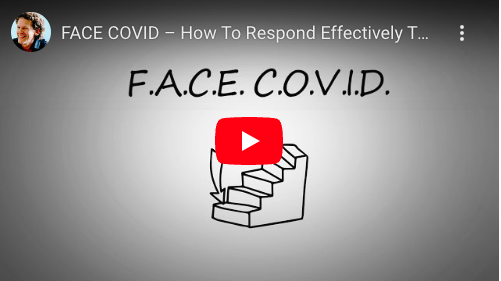F.A.C.E. C.O.V.I.D.: Practical tips for managing your mental health in the age of the coronavirus

During this highly stressful time, it is helpful to have simple strategies for managing your mental health. Dr. Russ Hariss, author of The Happiness Trap, shares his helpful tips.
F: Focus on what you can control
The world is dealing with the dangers of widespread illness related to the COVID-19 crisis. There is still much that is unknown about the transmission of the disease and when the pandemic will end. This has left many with feelings of uncertainty about future plans, job prospects, and safety. Focusing on all the things that are out of your control will only lead to feeling overwhelmed.
Take a moment to figure out what you can control. You cannot control your situation but you can control how you respond to it. Thoughts and emotions often arise automatically. However, if you focus on the present moment it becomes easier to choose how to respond to them.
A: Acknowledge your thoughts and feelings
Attempting to ignore your thoughts and feelings often makes them even more powerful. Instead, try observing them as if you’re a curious scientist. As you are observing your inner experience, try thinking, “I am noticing the feeling of sadness” or “I am having thoughts about health problems.” This helps you to face your thoughts and feelings while taking away their power.
C: Come back into your body
You cannot control your thoughts or feelings, but you can control your physical actions. Grounding yourself in your body does not mean you are trying to avoid or distract yourself from your inner experience. It means you acknowledge your uncomfortable thoughts and feelings while being able to take action to respond to the moment. Connect with your body by trying the following:
- Breathe slowly
- Sit or stand upright and slowly straighten your spine
- Slowly stretch your arms and or neck and roll your shoulders
E: Engage in what you’re doing
Focus on what you can control in the present moment by fully engaging in what you’re doing. If you are having trouble focusing you can try one of the following strategies and then refocus on the your present activity:
- Look around your environment and notice 5 things you can see
- Notice 3 or 4 things you can hear
- Notice what you can currently smell or taste
C: Committed action
Commit to taking meaningful action guided by your core personal values. In addition to following the CDC guidelines of handwashing and physical distancing, how can you be of service to your loved ones and community? Can you help someone in need while keeping yourself safe? Can you share a meaningful conversation? How can you take care of yourself? Can you cook a healthy meal?
O: Opening up
“Open up” by making room for difficult feelings and being kind to yourself. We can’t prevent difficult feelings. But we can make room for them, acknowledge their presence, and be kind to ourselves.
V: Values
Our actions should be guided by our values. What do you want to stand for in the face of this pandemic? How do you want to reflect on your actions when this is over? What is most important to you in life?
Your values might include love, respect, kindness, and humor. Look for ways to live those values even under quarantine.
I: Identify resources
Identify resources for support and advice. Utilize your friends, family, and social network. Also, check-in with them and see how you can be of service. Find reliable sources of information. If you are in California, check out the following sources:
D: Disinfect and Distance Physically
Follow the CDC guidelines to protect yourself and others. Remember to practice physical distancing rather than emotional distancing. Find creative ways to stay in contact with your support system (e.g. Netflix Party).
In summary:
F: Focus on what you can control
A: Acknowledge your thoughts and feelings
C: Come back into your body
E: Engage in what you’re doing
C: Committed action
O: Opening up
V: Values
I: Identify resources
D: Disinfect and Distance Socially
If you are interested in learning strategies for managing your mental health, please schedule a free phone or video consultation.

Dr. Jason von Stietz specializes in Cognitive Behavior Therapy and Sport/Performance Psychology in Torrance, CA. He provides online therapy (telehealth) by way of the Torrance office and is available for a free initial phone consultation. Dr. von Stietz works with individuals from Long Beach, the greater Los Angeles area, and the South Bay including Palos Verdes, Redondo Beach, Hermosa Beach, Manhattan Beach, El Segundo and all over California.
